- Home
- Fredric Brown
Compliments of a Fiend Page 3
Compliments of a Fiend Read online
Page 3
“Not then. He said—I'll try to get his exact words here—'That's swell. Is he there? Is he free now?' Am was in the back room, so I said yes, he was free. He said, 'I'm staying in Room four-eighteen at the Gresham Hotel. I wonder if it would be possible for your operative to drop in a few minutes now so I can talk to him and see if he'd fill all the requirements—if he's really the type of man I want.'
“I told him I was sorry, but that wasn't our way of doing business; that he'd have to come in and talk the case over with me and that if I accepted it, he could then talk to the operative.
“He said, 'I wish you could make an exception in this case. It's this way: I'm going back to Milwaukee tonight and because of some other phone calls I've got to make, I won't be able to come to your office today. But if I could see this operative and convince myself that he's the man for the job, then everything will be set in my mind. I'll be back in Chicago Friday, day after tomorrow, and I can see you then and give you the case, and a retainer. It'll be a fairly long job, and I'm prepared to spend several thousand dollars on it if necessary.'“
“Bait,” I said.
Starlock nodded. “Yes, bait. I see that now. But—as I saw it then—what did I have to lose? It was after four; Am was through with the job he'd been working on—a skip-trace matter—and I wasn't going to be sending him out on anything else today, so there was nothing to lose. And maybe—however slight the chance— a several thousand dollar bit of business to gain. If it was trap, Ed, it was a beautifully baited one.”
“And you walked into it?”
“It looks like I sent Am into it. I said, 'All right, I'll send the operative—his name is Ambrose Hunter—over to talk to you, but you understand that he isn't authorized to accept the case; that will have to be handled through me.' And he said, 'That's fine, Mr. Starlock. I'll be here waiting for him.'“
Starlock stopped for so long that I asked, “Was that all the conversation?”
“Yes, except that he said good-bye and I said good-bye. And then I called Am in from the back room and told him about it and sent him around. The Gresham's only a few blocks and I figured he might be through talking to the guy by five. I told Am not to commit himself on anything but to find out, if he could, what the job was all about and whether the guy seemed to be on the level, and to phone me as soon as he was through talking to him—here at the office if it was before five, or at home this evening if it was after.”
I asked, “Why did you want to know before tomorrow morning?”
“So I could plan assignments. We've got a case starting tomorrow that I'd have put Am on otherwise—but I didn't want to if this thing looked really good. This other case might take a week or two—a shadow job—and I didn't want to start Am on it if there was a good chance I'd have to pull him off in a few days. In that case I was going to put you on the tail job and keep Am on the skip-trace angles. And I wanted to know tonight because I always plan out my next day's arrangements in the evening.”
Starlock's swivel chair creaked again as he leaned forward and turned to face Estelle. He said, “That's all we know on this end, Miss Beck. Does it help you remember where you heard—whatever it was you heard?”
Estelle's face was white and her eyes wide and scared. She said, “I—I'm afraid it doesn't.”
Starlock said, “Ed, while Jane's taking notes, put your conversation with Miss Beck on the record—just exactly what it was she said about an Ambrose Collector. Maybe it'll help her remember.”
The few things she'd said, and I'd said or asked, about the Ambrose Collector were so vivid in my mind that I was able to repeat them word for word, and Jane took them down.
Starlock said thoughtfully, “Sounds like it might be a lead to something, but God knows to what. Miss Beck, now that you've heard everything we know, don't you think it would be a good idea for you to go off by yourself, in the back room, and just concentrate on trying to remember?”
“All right, I'll try.”
“Fine. Ed, you show her back there and turn on the light for her. And shut the door so our conversation won't distract her.”
I put my hand on Estelle's shoulder and she stood up. We got as far as the doorway and then stopped and turned when Starlock said, “Just a minute.”
His swivel chair creaked protestingly. “Miss Beck, when you think of something—or when you give up for the night and want to go home—come back. Ed and I may be out by then; if so, tell Jane here anything you've got to tell, and we'll get it from her. Okay?”
Estelle nodded.
“If you decide to go home, and Ed and I are gone at the time, take a cab. The agency will pay for it; Jane will give you the money. And do us this favor; go right home and to bed when you decide to leave, and maybe it'll come to you while you're trying to go to sleep. That's sometimes when people do their best remembering. And if it does, telephone right away. Jane will be at that phone all night, whether we're here or not.”
Estelle said, “I don't think I'll go to sleep till I think of it. I don't think I'll be able to.”
I let her to the back room and turned on the light. Estelle started for the chair in the far corner, the one Uncle Am always sat in. I wished that she'd taken a different one, but I didn't want to tell her. She looked pale and scared enough as it was. Her eyes looked enormous and her mouth was a bright scarlet against the whiteness of her face.
She said, “Oh, Eddie, I feel so awful not to be able to think of something that ought to be so easy—and when it's so important.”
I patted her shoulder. I said, “Don't take it that way, baby. Maybe it isn't important at all. Pretend it isn't, and just relax. Don't try too hard; that's probably what you're doing. Think about something else for a while. Maybe it would help to read a magazine; there's a stack of them on the table there. And give us a smile.”
She tried, but it was a weak, frightened smile.
I leaned over and kissed it.
I said, “Don't worry, 'Stelle. Uncle Am's too smart a customer to let any Ambrose Collector collect him. He's all right.”
I wished that I'd been able to believe what I was telling her.
I didn't give her a chance to answer; I went out and closed the door behind me.
Jane Rogers was dialing a number on the telephone. I heard her ask if Harry Dickson was there, and I wondered who Harry Dickson was. I looked at Starlock, but couldn't catch his eye; he was watching Jane.
Then Jane said, “Just a moment, please,” and nodded at Starlock. He picked up his own phone and said, “This is Ben Starlock, Harry. How's everything?”
I bent over Jane's desk and asked, “Who's this Dickson character, Jane?”
She was looking down at her typewriter, although there wasn't any paper in it, and didn't look up at me. She said, “Mr. Starlock knows him. He's on nights at the morgue.”
I said, “Oh,” and walked over to the window. It's a window on an air shaft and all I could see in it was my own reflection standing there in silhouette against the lighted room, a rigid shadow with no face; perhaps it was just as well I couldn't see my face.
I heard Starlock say, “Listen, Harry, I want to give you a description—”
He gave it and then there was a long wait. I found myself almost wishing Uncle Am would be there. Then we'd know. Because if he wasn't dead, then somebody had him. A madman? An Ambrose Collector? A fiend? I remembered a typographical error I'd made once when I was an apprentice printer five years before. I'd been setting the type for a “Compliments of a Friend” ad for a church bulletin; I'd left out the second letter of the last word: Compliments of a Fiend. It had been funny then. I shivered a little....
Chapter 3
HE WASN'T AT THE MORGUE.
Starlock's round face is pretty dead-pan, but I could see relief in it when he put down the phone. I don't know whether I felt any relief or not; I was pretty numb just at that moment.
We were sure, though, that Uncle Am wasn't at the morgue. I'd heard the way Starlock had checked into it; identified or not identified, no body that remotely could have been Uncle Am had been reported since four o'clock that afternoon.
I'd turned back from the window and he'd swiveled his chair around to face me. He said, “Any ideas, Ed?”
“Some pretty vague ones,” I told him. “One point—the guy called here at four. Do you think he knew Uncle Am was here and free to be sent over to the Gresham?”
“I'd say he probably did know, Ed. Otherwise, he was taking a long-shot chance of getting him. You ops average maybe an hour a day in the office here, and that means that unless he knew Am was here, he was taking a chance no better than one out of eight of getting him. I think we can assume he specifically wanted Am, don't you?”
I said, “I think we can. First, from his asking for an op with an unusual kind of experience, a kind that Uncle Am has. Second, from his calling himself the Ambrose Collector—even though he disguised it as a proper name. But what I'm leading up to is that the call was probably put through from a phone right near here. I'd say he knew Uncle Am by sight and was watching the entrance of the building here—or following Uncle Am. And when he saw him enter the building, he allowed time for him to get up to the office, and then put in his phone call.”
“Sounds logical, Ed. I don't think we could use the phone call angle—there are a thousand phones within a block of here that he could have used—dozens of public ones in booths. But I think you've got something there in that way we can say he knew Am by sight as well as by name. The phone call came just a few minutes after Am came in. It looks more like timing than coincidence.”
He got up from behind his desk and started pacing back and forth between it and the door.
He said, “I think we may as well go over to the Gresham. I don't expect to get anythi
ng there, especially as they've probably changed shifts between four o'clock and now, but we can try. We can find out who is in Room four-eighteen, even though I think we can assume Am was probably intercepted by someone before he got that far.”
“Intercepted how?”
“How would I know? Maybe right in the entrance of this building, by the man who made the phone call. Maybe in the lobby of the hotel. But I've got a hunch that he never got as far as Room four-eighteen. If he was supposed to get that far, the registration of Room four-eighteen would have been in the name Am was supposed to ask for. That's why I don't really expect to get anything at the hotel— although we'll try, of course.”
He leaned against the side of the doorway, almost filling it. He said, “Unless you've got a better idea, Ed. Can you think of any other lead?”
“Only Estelle. The poor kid is beating her brains out back there right now; she'll think of where she heard that Ambrose Collector business. It's only a matter of time. Of course we can go to the hotel first and then come back; she'll still be here unless she's thought of the answer, and then Jane'll have it.”
Starlock said, “I like the way she's taking this. She must like Am a lot. Well, anything before we go?”
“How about the hospitals? And the police?”
“Jane's got orders to work on the hospitals, starting as soon as we leave. The police—well, I'd like to get just a little more than we have right now before we turn it over to them, Ed. They won't take it too seriously yet; you know that. After all, Am's been missing only about eight hours.”
I tried to look at it from the point of view of the cops, and saw that he was right. They'd just assume that Uncle Am was hanging one on or had strayed from the fold and they wouldn't start any checking till morning. But I said, “There's Bassett—Captain Bassett. He knows Am well enough to take this seriously.”
“Sure, Bassett would. And a couple of others—but all ones on the day shift. Unless you insist, Ed, I'd rather let the police angle go until tomorrow.”
“Okay,” I said. “Let's go, then.”
He took his hat down off the stand and said, “You're on your own, Jane, as long as you stick by that phone, after you call the hospitals and type up those notes. And use the unlisted phone for the outgoing calls so you won't block any possible incoming ones.”
“All right, Mr. Starlock.”
“And send out for coffee and sandwiches whenever you want to; Corey's is open all night, and they deliver.”
We took the elevator down and were lucky enough to catch a cab right outside. I'd have just as soon walked a half-dozen blocks myself, but Starlock yelled at the cab and it pulled in to the curb.
In the cab, he asked, “How you set on sleep, Ed?”
“I'll be all right.”
“That isn't what I asked. Are you ahead or behind?”
“A little behind,” I admitted. “I was up late two nights in a row. But don't worry; I'm good for all of tonight—and tomorrow too.”
He grunted. “Wish I was still your age. Well, here we are.”
The Gresham is a medium-sized Loop hotel, medium-priced and medium quality. We crossed the lobby, almost deserted by now, and walked up to the desk. A single clerk was on duty behind it, back of him a girl chewed gum at a switchboard.
Starlock said, “A little while ago I called and asked if you had a Mr. Collector registered here and was told you hadn't. Was it you I talked to?”
“I don't recall it. About how long ago was that?”
“An hour and a half ago, about ten-forty.”
“Oh, then you probably talked to Mr. Blake, the night manager; he relieves me at the desk between ten and eleven. Is there anything I can do for you?”
“Yes,” Starlock said. “Who is in Room four-eighteen?”
“I'm afraid you'll have to talk to Mr. Blake for information of that kind. Unless—
“No, we're not the police. Private detectives.” Starlock flashed his buzzer. “Is Blake in?”
“One moment.” The clerk said over his shoulder, “Dotty, get Mr. Blake; put him on the desk phone.”
When the phone on the desk rang, he picked it up and talked briefly. When he put it down, he pointed to a door marked “Private.” He said, “That's Mr. Blake's office; go right in.”
We went in. A sour-faced man with patent-leather hair was doing something at a big mahogany desk. I didn't like his looks and I didn't like his voice when he said, “Well, gentleman?”
But we sat down across the desk from him and Starlock explained what had happened—enough of it, anyway, to justify the question he was leading up to. He said, “We'd like to have two things. First, the names and addresses of whatever clerks were behind the desk this afternoon between four and five o'clock, and second, we'd like to know who is in Room four-eighteen.”
The manager frowned. “I'm afraid I can't supply either point of information, gentlemen. There were two clerks on duty at the desk at that time, but you can talk to them tomorrow when they're on duty again. As for giving out information about one of our guests, that is definitely against our policy.”
Starlock said, “This may be a serious matter, Mr. Blake. Possibly it's kidnapping, or even murder.”
“Then you should report it to the police. If the information in question is requested officially, I can't refuse it, of course. Otherwise, it is definitely against our policy to give such information.”
Starlock stood up slowly. “If you feel that way about it, Mr. Blake, we'll have the information requested officially.”
He went out and I followed him. Outside the door I put a hand on his arm and stopped him. I asked him, “Are you going to let that son of a bitch get away with that?”
“What else can I do, Ed? I'd love to slap him down, but he could sue me out of my shirt if I did. Anyway, we'll get the information tomorrow, or the police will— if Am hasn't shown up by then.”
“But there's a chance—even a slim one—that it'll help us to have tonight?”
“Well, yes. But—”
“Mr. Starlock,” I said, “I quit. As of now.”
He grinned at me, knowing what I meant. I wanted to grin back, but couldn't make it; I was too mad. Not at Starlock, of course. And I didn't want to grin anyway; I wanted to stay mad.
I went back in the door marked “Private” and closed it behind me. The sour-faced man looked up, and he must have guessed why I'd come back. But he guessed too late; I had hold of his wrist before his hand reached the button on the corner of his desk.
And then I was around behind his chair with the wrist twisted up behind his back. And I thought of the idea of his yelling before he did, and my other hand was clamped tight over his mouth. Just long enough for me to say, 'You can yell if you want to, but by the time anybody gets here, you'll have a broken arm—to start with.”
I took my hand off his mouth. He didn't yell.
I said, “Listen, I'm not a Starlock operative. The man who was kidnapped—or murdered—is my uncle and the best friend I've got. I'm going to find him and I'm not going to let any hotel rules or regulations get in the way. I want the names and addresses of those two clerks, or I'm going to beat the hell out of you here and now. At least I'll have a plenty good start at it by the time any help gets to you. Shall I start now?”
“This is going to get you in plenty trouble, young man.”
“I'll count to three; then I let go of your arm and start swinging. One. Two—
“Their addresses are in the file box on the corner of the desk; I don't know them offhand. Their names are Wallace Corrigan and Henry Everest.” I let go of his arm, but kept on the side of him that kept him from reaching for the buzzer button on the phone without reaching pass me, and I let him look up the clerks' addresses. Neither of them had telephones but I noticed that both addresses were fairly close in.
“Who's in four-eighteen?” I asked him.
“I don't know. We've got hundreds of rooms here. And the cards on current registrations are at the desk.”
“Call the desk and ask,” I told him. “Get all the information you can on him. And be careful what you say.”
I pushed the desk phone toward him and I pushed him, chair and all, back a little so I could keep my eyes on his.
I handed him the phone and let him do his talking, and he kept in line. When he put it down, he said, “Name is Richard Bergman. Registered from Cleveland, been here three days. That's all the registration card shows.”

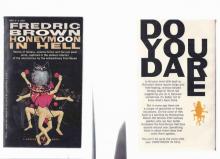 Hall of Mirrors
Hall of Mirrors Honeymoon in Hell
Honeymoon in Hell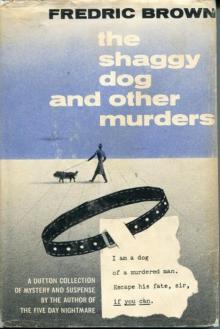 The Shaggy Dog and Other Murders
The Shaggy Dog and Other Murders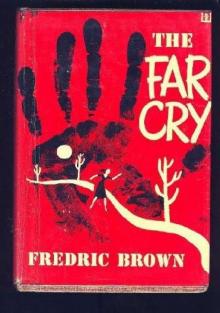 The Far Cry
The Far Cry Arena
Arena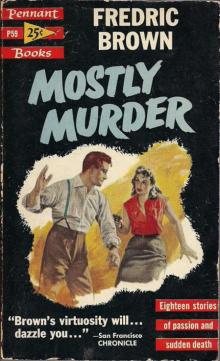 Mostly Murder
Mostly Murder The Geezenstacks
The Geezenstacks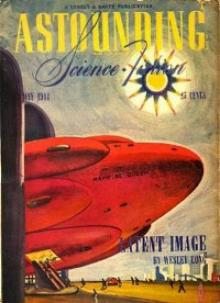 The Yehudi Principle
The Yehudi Principle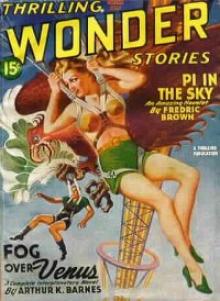 Pi in the Sky
Pi in the Sky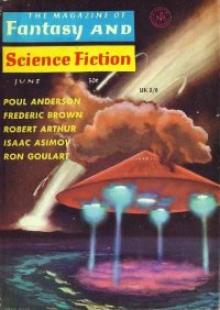 Eine Kleine Nachtmusik
Eine Kleine Nachtmusik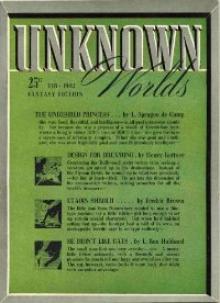 Etaoin Shrdlu
Etaoin Shrdlu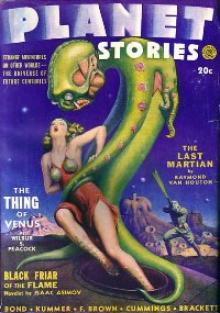 The Star Mouse
The Star Mouse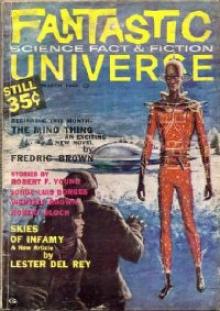 The Mind Thing
The Mind Thing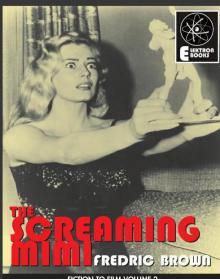 The Screaming Mimi
The Screaming Mimi The Fabulous Clipjoint
The Fabulous Clipjoint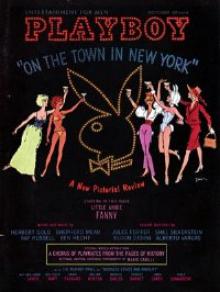 Puppet Show
Puppet Show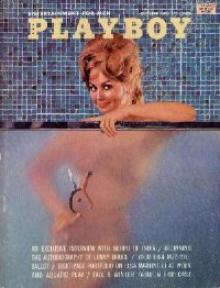 It Didn't Happen
It Didn't Happen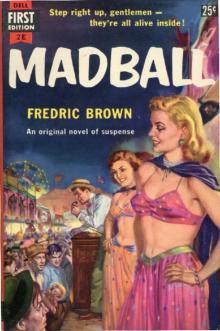 Madball
Madball Happy Ending
Happy Ending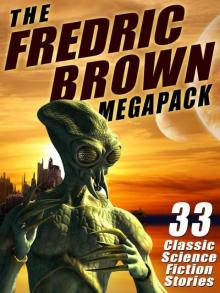 The Fredric Brown Megapack: 33 Classic Science Fiction Stories
The Fredric Brown Megapack: 33 Classic Science Fiction Stories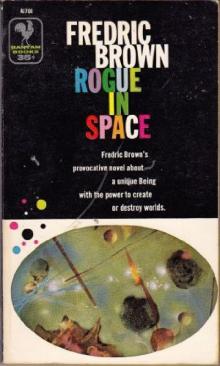 Rogue in Space
Rogue in Space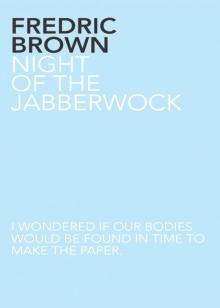 Night of the Jabberwock
Night of the Jabberwock The Dead Ringer
The Dead Ringer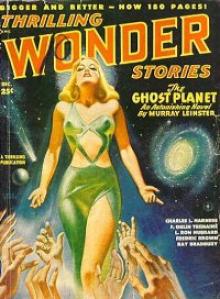 Knock
Knock We All Killed Grandma
We All Killed Grandma Space On My Hands
Space On My Hands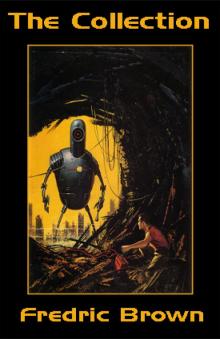 The Collection
The Collection The Second Fredric Brown Megapack: 27 Classic Science Fiction Stories
The Second Fredric Brown Megapack: 27 Classic Science Fiction Stories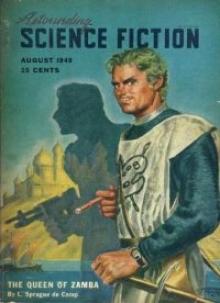 Letter to a Phoenix
Letter to a Phoenix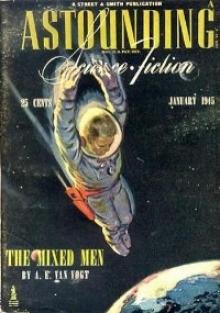 The Waveries
The Waveries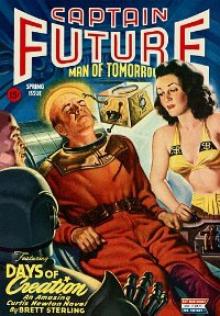 Nothing Sirius
Nothing Sirius The Deep End
The Deep End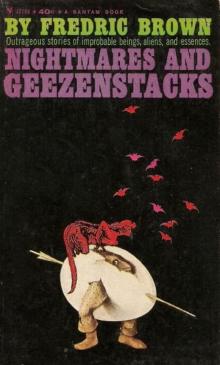 Nightmares & Geezenstacks
Nightmares & Geezenstacks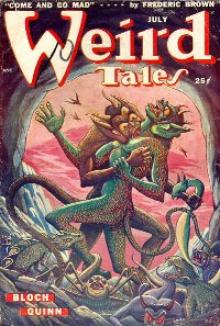 Come and Go Mad
Come and Go Mad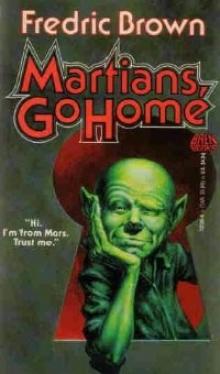 Martians, Go Home
Martians, Go Home